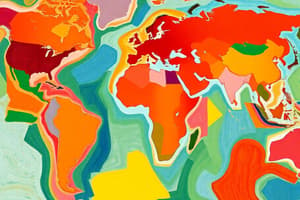Podcast
Questions and Answers
Which subfield of geography primarily focuses on natural features and ecosystems?
Which subfield of geography primarily focuses on natural features and ecosystems?
- Physical Geography (correct)
- Cultural Geography
- Environmental Geography
- Human Geography
What is the term for the exact coordinates of a place?
What is the term for the exact coordinates of a place?
- Geographical Scale
- Relative Location
- Absolute Location (correct)
- Spatial Analysis
Which of the following tools is NOT commonly associated with geographical techniques?
Which of the following tools is NOT commonly associated with geographical techniques?
- Cartography
- Remote Sensing
- Statistical Analysis (correct)
- Geographic Information Systems (GIS)
What key concept in geography refers to the flow of people, goods, and ideas between locations?
What key concept in geography refers to the flow of people, goods, and ideas between locations?
Which climatic zone is characterized by high temperatures and significant rainfall?
Which climatic zone is characterized by high temperatures and significant rainfall?
What is the study of human interactions, cultures, and societies in relation to their spatial aspects called?
What is the study of human interactions, cultures, and societies in relation to their spatial aspects called?
Which of the following is NOT considered a major landform?
Which of the following is NOT considered a major landform?
What is a key current trend in geography that emphasizes environmental sustainability?
What is a key current trend in geography that emphasizes environmental sustainability?
Flashcards are hidden until you start studying
Study Notes
Overview of Geography
- Study of the Earth’s landscapes, environments, and the relationships between people and their environments.
- Subfields include human geography, physical geography, and environmental geography.
Types of Geography
-
Physical Geography
- Focuses on natural features: landforms, climate, vegetation, soils, and ecosystems.
- Examples: geology, biogeography, meteorology, and hydrology.
-
Human Geography
- Examines human activities, cultures, societies, and their spatial interactions.
- Key areas: urban geography, cultural geography, economic geography, and political geography.
-
Geographical Techniques
- Use of tools and methods: Geographic Information Systems (GIS), remote sensing, cartography, and spatial analysis.
- Supports data collection, analysis, and visualization of geographic information.
Key Concepts in Geography
- Location: Absolute (exact coordinates) vs. relative (position in relation to other places).
- Place: Physical and human characteristics that distinguish locations.
- Scale: The level of detail and scope of a geographic study, from local to global.
- Region: Areas defined by shared physical or human characteristics.
- Movement: The flow of people, goods, and ideas between places.
- Human-Environment Interaction: How humans adapt to and modify their environment.
Important Geographical Features
- Continents and Oceans: Seven continents and five major oceans shape human and ecological interactions.
- Landforms: Mountains, valleys, plains, plateaus, and deserts.
- Climate Zones: Tropical, dry, temperate, continental, polar; influence ecosystems and human activities.
Spatial Thinking
- Understanding spatial patterns and relationships is essential in geography.
- Maps are fundamental tools for visualizing geographic information and analyzing spatial data.
Current Trends in Geography
- Increasing focus on sustainability and environmental issues.
- Integration of technology in geographic research and education.
- Globalization's impact on cultural exchange and environmental changes.
### Overview of Geography
- The study of Earth's landscapes, environments, and the relationship between humans and their environment.
- Multiple subfields including: human geography, physical geography, and environmental geography.
Types of Geography
- Physical Geography: Studies natural features like landforms, climates, vegetation, soils, and ecosystems.
- Human Geography: Examines human activities, cultures, societies, and their spatial interactions.
- Geographical Techniques: Use of tools like GIS, remote sensing, cartography, and spatial analysis.
Key Concepts in Geography
- Location:
- Absolute: Exact coordinates like latitude and longitude.
- Relative: Position in relation to other places, using landmarks or directions.
- Place: Defined by unique physical and human characteristics.
- Scale: Level of detail and scope of a study, ranging from local to global.
- Region: Areas defined by shared physical or human characteristics.
- Movement: Flow of people, goods, and ideas between places.
- Human-Environment Interaction: How humans adapt to and modify their environment.
Important Geographical Features
- Continents and Oceans: Seven continents and five major oceans influence human and ecological interactions.
- Landforms: Mountains, valleys, plains, plateaus, and deserts vary in climate, resources, and human settlements.
- Climate Zones: Tropical, dry, temperate, continental, and polar zones influence ecosystems and human activities.
Spatial Thinking
- Essential geographical skill involving understanding spatial patterns and relationships.
- Maps are crucial for visualizing geographic information and analyzing spatial data.
Current Trends in Geography
- Increased focus on sustainability and environmental issues.
- Integration of technology into geographic research and education.
- Globalization's impact on cultural exchange and environmental changes.
Studying That Suits You
Use AI to generate personalized quizzes and flashcards to suit your learning preferences.




